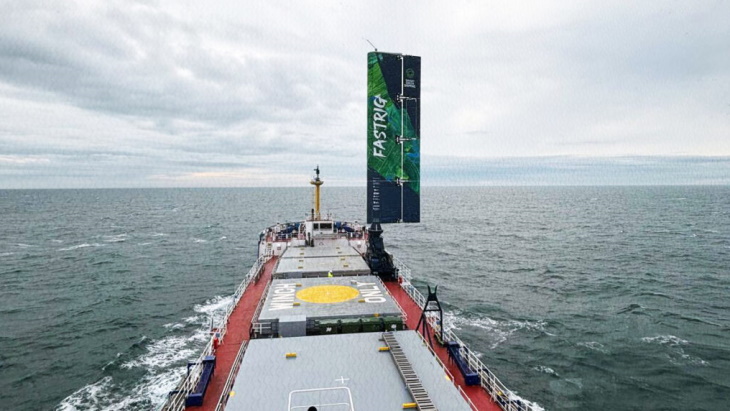In collaboration with renewable marine technology specialist Smart Green Shipping (SGS), the project aims to establish new ways of reducing fuel and greenhouse gas emissions on Nuclear Transport Solutions' (NTS) nuclear transport ships.
A FastRig wingsail - a lightweight, retractable solution which uses specialist sensors and automated technology to adapt to changing weather conditions, allowing it to deploy and retract as necessary to ensure both fuel efficiency and safety - has now been installed on the Pacific Grebe. The innovative technology uses wind power to help propel the ship, potentially reducing fuel consumption and CO2 emissions by up to 30% on a full commercial installation.
NTS and SGS's collaboration marks the first time a system like this has been installed on a specialist ship of this kind.
"We are proud to be working with Smart Green Shipping on this pioneering project as we continue our commitment to reducing our environmental impact, while continuing to deliver the highest standards of safety and security in the transport of nuclear materials," said NTS CEO Seth Kybird. "The addition of the FastRig system aligns with our goals for sustainable operations and demonstrates our commitment to pioneering green technologies in the maritime sector."

(Image: NTS)
Pete Buchan, NTS's managing director of shipping added: "While this is still a trial at this stage, it's the first real-world application of this wing and could change the way all ships sail, drastically reducing emissions and fuel usage across the industry. We're really proud of the role we've had in this project and can't wait to see the final results of the trial."
"NTS demonstrates great leadership in pioneering the world first sea trials of FastRig, we're delighted to work in partnership with them," said SGS CEO Diane Gilpin. "Their ships demand the very highest safety standards and our collaboration shows Fastrigs can be installed on any ship. NTS is allowing SGS to undertake formal sea trials which gives us accurate, independently verified performance data against which we can corroborate the digital models and tank testing results the University of Southampton have been developing."
The project is part of a two-year plan called Winds of Change, which is running from April 2023 to March 2025. The project is itself part of the Clean Maritime Demonstration Competition Round 3 (CMDC3), which was announced in September 2022, funded by the UK Department for Transport and delivered in partnership with InnovateUK. As part of the CMDC3, the Department allocated GBP60 million (USD78 million) to 19 flagship projects supported by 92 UK organisations to deliver real world demonstration R&D projects in clean maritime solutions.
NTS ships are operated by Pacific Nuclear Transport Ltd (PNTL), which is owned mainly by NTS - part of the UK's Nuclear Decommissioning Authority - and partly by the French nuclear fuel company Orano and a consortium of Japanese utilities which use its services.
PNTL operates three diesel-powered specialist ships for the transport of high-level waste and other nuclear material: the Pacific Heron, the Pacific Egret and the Pacific Grebe. So far PNTL has shipped more than 2000 nuclear casks some 5 million miles to countries including Belgium, Finland, France, Germany, Greece, Italy, Japan, the Netherlands, Portugal, Sweden, Switzerland and the USA.

_730_26228.jpg)



_730_93825.jpg)

_83147.jpg)
_87299.jpg)






